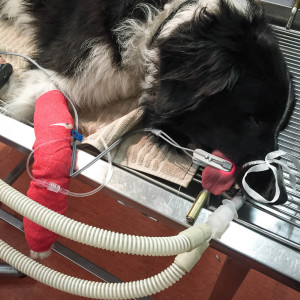 Surgery is scary for both dogs and owners. Although recovery process is quite simple, the first few days after the procedure require special care for your four-legged family member. We would like to help you give your pets just what they need after the surgery with these 6 simple tips!
Surgery is scary for both dogs and owners. Although recovery process is quite simple, the first few days after the procedure require special care for your four-legged family member. We would like to help you give your pets just what they need after the surgery with these 6 simple tips!
The first couple of days after dog surgery, your pet will be tired, groggy, sleeping more than usual, with poor balance and motor control. Loss of appetite, panting, nausea, vomiting and even a loss of bladder control are also likely to occur. So, the first 2 days require extra precautions, according to Animal Health Institute. After that, you should keep your furry companion from jumping, running and biting at the wound and that would be pretty much enough.
 1. Your dog should be kept warm, but not too hot. Because of the anesthesia, your pet won’t know if it’s cold or hot and you’ll need to help your beloved animal friend out and adjust the heat for them.
1. Your dog should be kept warm, but not too hot. Because of the anesthesia, your pet won’t know if it’s cold or hot and you’ll need to help your beloved animal friend out and adjust the heat for them.
2. Keep your pet on the floor. This is important because, even when it seems that anesthesia is completely gone, your doggy still might stumble or fall out of the bed/chair. It will be harder for post-op animal patients to navigate obstacles, so it’s better to find them a comfortable place to rest, not too far from the door.
 3. Keep your furry patient isolated from other animals and children. Your usually sweet puppy might snap or bite someone these days, because of the pain following surgery and anesthesia caused disorientation. Not only will he act unusually, but the other dogs might lick his wounds or play with him intensely, which is something that should be avoided by all means. Love Animals Org claims these changes in behavior are temporary, so don’t worry, your doggy won’t become snappy!
3. Keep your furry patient isolated from other animals and children. Your usually sweet puppy might snap or bite someone these days, because of the pain following surgery and anesthesia caused disorientation. Not only will he act unusually, but the other dogs might lick his wounds or play with him intensely, which is something that should be avoided by all means. Love Animals Org claims these changes in behavior are temporary, so don’t worry, your doggy won’t become snappy!
4. Take your doggy outside every couple of hours the day after the surgery. Because of the IV fluids your pet received during the surgery, he/she will have to urinate more frequently. If not given the chance to go outside as necessary, your dog will have accidents indoors. Some of them even pee in their sleep, because they are likely to sleep much deeper than they do usually. Therefore, don’t let your furry companion sleep on anything that couldn’t be cleaned up later.
 5. Give your dog enough water! Although post-op dogs don’t think they are thirsty, they actually need liquids more than usual. However, it doesn’t mean you should leave water, though, because they could drop their head in the water and even drown. When it comes to food, offer them something bland, such as hamburger meat or boiled chicken. The first day after the surgery, vomiting and nausea might occur, that’s why Pets WebMD suggests to offer smaller meals (without treats).
5. Give your dog enough water! Although post-op dogs don’t think they are thirsty, they actually need liquids more than usual. However, it doesn’t mean you should leave water, though, because they could drop their head in the water and even drown. When it comes to food, offer them something bland, such as hamburger meat or boiled chicken. The first day after the surgery, vomiting and nausea might occur, that’s why Pets WebMD suggests to offer smaller meals (without treats).
 6. Listen to the advice and instructions your vet has given to you. If you’re uncertain about something, call your veterinary and you’ll surely get all the information you need. According to the World Veterinary Association, the communication between the owner and the vet is crucial for a pet’s health during the post-op period.
6. Listen to the advice and instructions your vet has given to you. If you’re uncertain about something, call your veterinary and you’ll surely get all the information you need. According to the World Veterinary Association, the communication between the owner and the vet is crucial for a pet’s health during the post-op period.